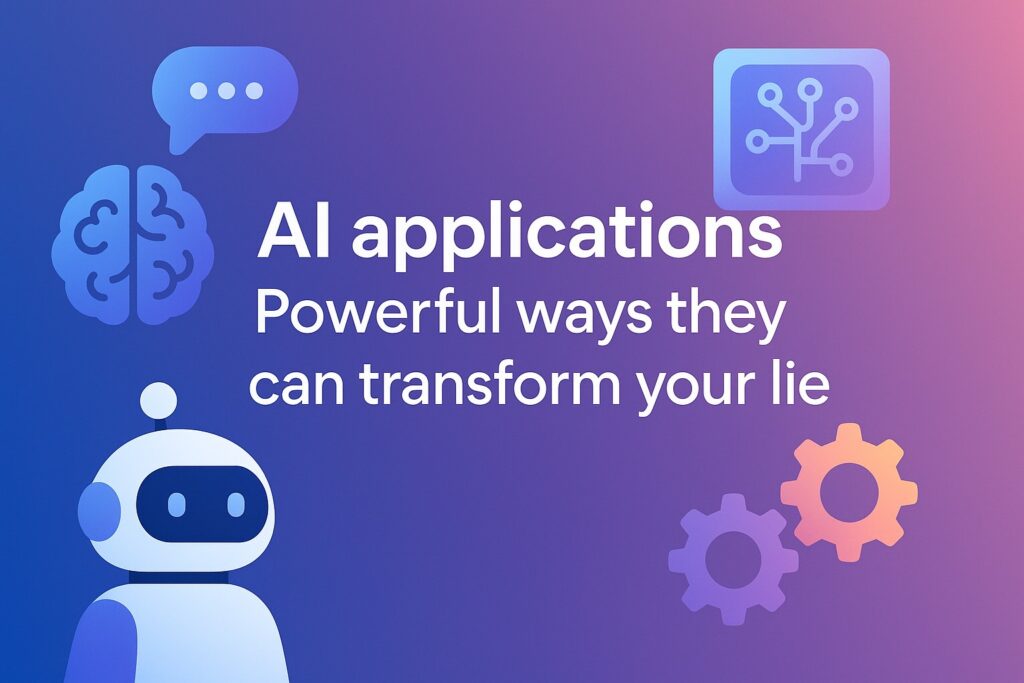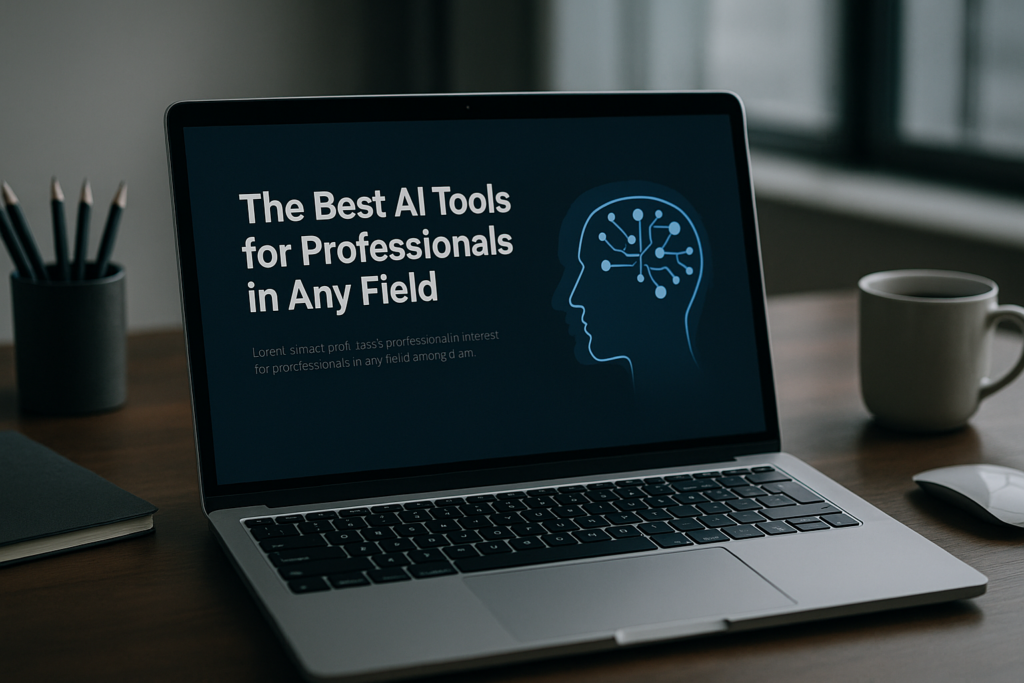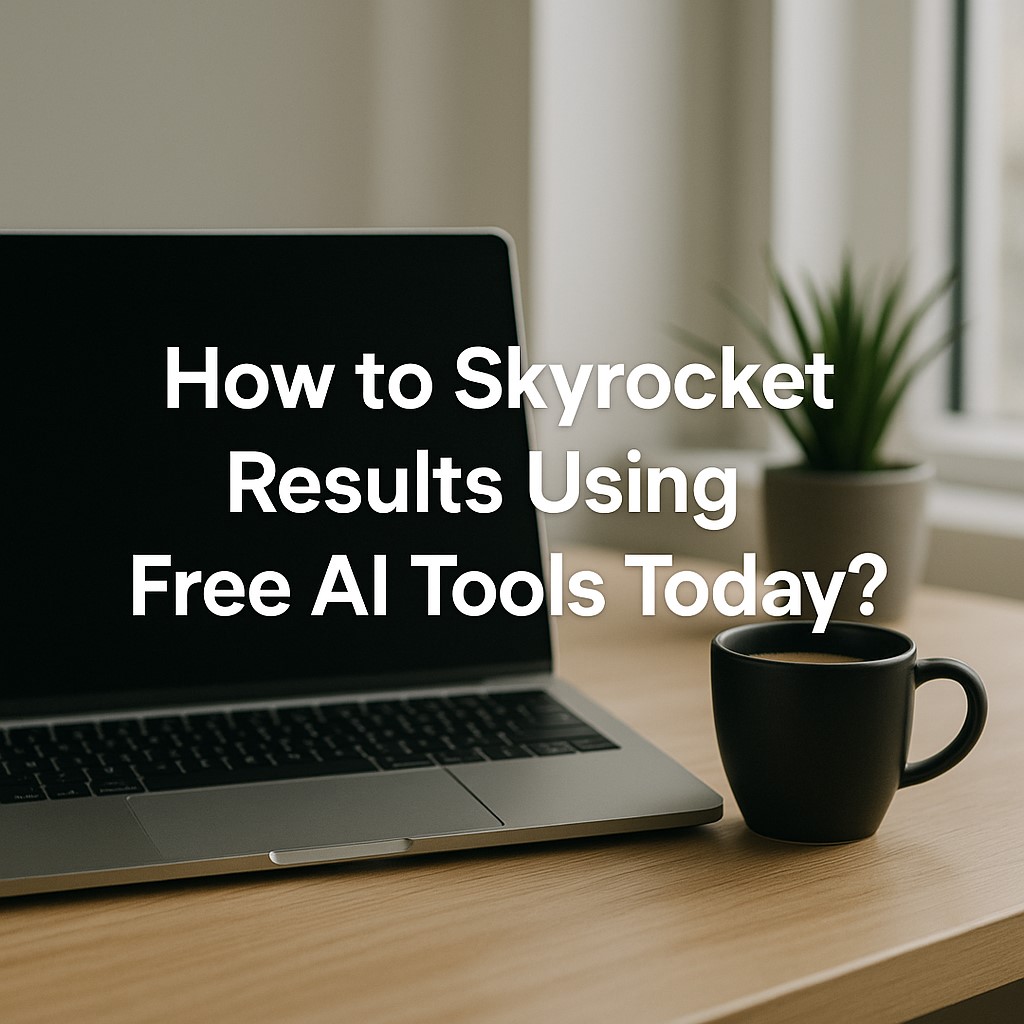AI applications are changing the way we learn, work, and solve problems—let’s explore how these smart tools can make your life easier and more efficient!
AI are everywhere today. You might not notice them, but they’re part of apps, websites, and even your daily schoolwork. From chatbots to study helpers, these smart tools are designed to make life easier.
But what exactly are AI applications? Simply put, they are programs that use artificial intelligence to do tasks that usually require human thinking. They can learn, solve problems, and even make decisions. Whether it’s suggesting videos, correcting essays, or helping with math problems, AI do it all—fast and smart.
For students, AI are a big deal. They save time, give instant help, and make learning more personal. Instead of one-size-fits-all lessons, you get tools that adjust to your needs.
As AI applications keep improving, they’ll keep changing how we learn and work. Knowing how to use them can give you a big head start. So, let’s dive in and see why these tools matter so much today!
Table of contents
- How do AI applications transform healthcare services?
- AI applications in business process automation explained
- Top AI applications in finance and banking today
- AI applications in marketing and advertising strategies
- How do AI applications power predictive analytics?
- AI applications are revolutionizing the manufacturing industry
- Best AI applications and tools for small businesses
- AI applications enhancing cybersecurity and threat detection
- AI applications transforming education technology (EdTech)
- FAQs: AI applications
- Conclusion
How do AI applications transform healthcare services?

Smarter tools for better health
Healthcare is changing fast with the help of AI. Today, AI are used in hospitals, clinics, and even on your phone. These tools help doctors work faster, reduce errors, and give better care. For patients, it means quicker help, fewer mistakes, and a better experience.
Let’s see how AI applications are making healthcare smarter and easier for everyone.
AI helps doctors diagnose faster
Doctors often look at medical images like X-rays, CT scans, or MRIs to find health problems. But going through hundreds of images can take a lot of time. That’s where AI step in. AI can scan these images in seconds, spot problems like cancer, fractures, or infections, and even highlight risky areas for doctors to check.
For example, AI tools are now used to detect lung cancer early, which was very hard to do before. This early detection can save lives by starting treatment sooner. Plus, AI keeps learning from every image, making it better and faster over time.
Personalized treatments with AI
Not everyone reacts to medicines the same way. That’s why doctors need to know what works best for each patient. AI analyze patient data like age, lifestyle, and even DNA to suggest treatments that are more likely to work.
For example, in cancer treatment, AI can look at a patient’s genes and recommend a special therapy that targets only the cancer cells. This means fewer side effects and better results. It’s like having a smart assistant who helps doctors create a treatment plan made just for you.
AI makes hospitals more efficient
Long waiting times and lost records are a big headache in hospitals. AI help solve these problems. AI-powered systems manage appointments, update patient records, and even send reminders for medicine or follow-up visits.
Some hospitals also use AI chatbots to answer basic questions, like giving information about COVID-19 or helping patients find the right department. This saves time for doctors and nurses, so they can focus on serious cases.
Supports remote healthcare
With the rise of telemedicine, AI are playing a big role in remote healthcare. AI can monitor patients at home using smart devices. For example, wearable gadgets track heart rate, blood pressure, or sleep patterns. AI then sends alerts to doctors if something unusual happens.
This is super helpful for elderly patients or people with chronic diseases who need constant care but cannot visit the hospital often. AI makes sure they get timely help while staying at home.
Helps in drug discovery
Creating new medicines is a slow and expensive process. AI applications speed this up by analyzing data from millions of research papers and lab results. AI can predict which chemical combinations might work as new drugs, cutting down research time from years to months.
This was seen during the COVID-19 pandemic when AI helped identify potential treatments quickly. Faster drug discovery means faster cures for diseases.
AI applications in business process automation explained
How does AI make boring tasks easier?
Let’s be honest—no one likes doing the same boring task over and over again. Things like filling out forms, replying to the same emails, or updating spreadsheets? It’s tiring and wastes a lot of time.
That’s where AI come in. They can take over these routine jobs, so people can focus on work that actually matters. It’s like having a smart assistant who never gets tired and doesn’t make silly mistakes.
AI does the boring stuff for you
Picture this: You have to enter hundreds of names and numbers into a spreadsheet every day. Sounds boring, right? With AI applications, you don’t have to. AI can read the data, check if it’s correct, and fill in everything for you. Fast and mistake-free.
Businesses use AI for things like processing invoices, updating records, and even sorting through emails. Simple tasks, done in seconds.
Helping customers with no extra effort
Ever talked to a chatbot on a website? That’s another way businesses use AI applications. These bots can answer common questions, help track your orders, and even fix small problems.
The best part? They work 24/7. So, while humans sleep, AI keeps helping customers. Companies love this because it keeps customers happy without needing extra staff.
Faster approvals, less waiting
In many companies, managers need to approve things like leave requests or project budgets. Normally, this takes time. But with AI , this process is super quick.
For example, if someone applies for a day off, AI can instantly check if others are off too. Then it gives a smart suggestion: approve or not. This saves time for everyone.
Keeping teams on track
Working in teams is fun, but staying organized? Not so much. AI applications help by reminding people of deadlines, setting up meetings, and even suggesting who should do what.
Apps like Slack or Trello use AI to make sure everyone knows their tasks. No more forgotten assignments or missed meetings.
Making sense of data quickly
Businesses get loads of data every day. Looking through all of it by hand would take forever. But AI applications can handle it in real-time. They find patterns, create reports, and even send alerts if something looks wrong.
For example, if sales drop suddenly, AI spots it fast and lets the manager know. This helps fix problems early.
Top AI applications in finance and banking today
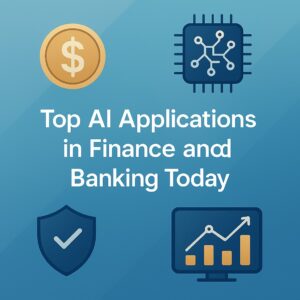
How is AI making your money smarter?
Money matters can get tricky. From managing accounts to spotting fraud, there’s a lot going on behind the scenes at banks and finance companies. Luckily, AI are now doing much of this work—faster and smarter than before.
Let’s see how AI applications are changing the finance world in ways you can actually notice.
AI helps stop fraud in real time
Ever gotten a message from your bank asking if you made a weird purchase? That’s AI at work. AI applications watch over millions of transactions and spot anything unusual. If someone tries to use your card in another country or makes a large, odd payment, AI flags it right away.
Banks like HDFC, Chase, and SBI already use AI for fraud detection. This keeps your money safer without you lifting a finger.
Smarter loan approvals
Applying for a loan can be stressful. Normally, people check your credit score, income, and documents. But now, AI applications do this automatically. AI reviews your data, checks risks, and even predicts if you’ll pay on time.
This makes loan approvals faster and fairer. Some apps even give instant loan decisions using AI, which is super helpful for students and young professionals.
Personal finance made easy
Managing your money is easier with AI. Many banking apps now have AI-based chatbots or assistants. They track your spending, remind you about bills, and suggest ways to save.
For example, apps like Mint or Money View use AI to analyze your expenses. They give you simple tips, like “You spent too much on food delivery this month. Try cooking at home!” This kind of help makes budgeting less boring.
AI-driven investment advice
Don’t know much about investing? No problem. Robo-advisors powered by AI applications can build a smart investment plan for you. They look at your goals, income, and risk level, then suggest where to invest.
Apps like Groww or Zerodha use AI to guide beginners. So even if you’re new to finance, you can start investing with confidence.
Speeding up customer support
Long wait times for banking help are annoying. Now, AI chatbots can answer your questions 24/7. Need to check your balance, report a lost card, or ask about bank charges? AI can handle it in seconds.
This is another way AI applications improve your daily experience with banks.
AI applications in marketing and advertising strategies
How AI makes ads smarter and more personal?
Have you ever wondered how Instagram shows you ads for things you just talked about? Or how YouTube recommends videos that match your interests perfectly? That’s not magic. It’s the power of AI applications working behind the scenes.
In marketing and advertising, AI help brands understand you better, create smarter ads, and connect with you in ways that feel personal. Let’s see how this works.
AI helps target the right audience
Gone are the days of random ads. Today, businesses want their ads to reach the right people. AI applications analyze data from your searches, likes, and shopping habits. This helps brands know what you like and when you’re most likely to buy.
For example, if you search for “best wireless headphones,” AI makes sure you see ads for headphones on Google, Instagram, or even YouTube. This kind of smart targeting saves companies money and gets you products you actually want.
Personalized content recommendations
Ever noticed how Netflix suggests shows you’ll probably enjoy? That’s AI again. In marketing, AI applications recommend content, products, or offers based on your past actions.
E-commerce sites like Amazon use AI to suggest items based on what you browsed or bought before. This keeps you engaged and makes shopping easier. It’s like having a personal shopping assistant who knows your taste.
AI-powered chatbots for instant help
When you visit an online store and a chat pops up saying, “Can I help you?” — that’s an AI chatbot. These AI applications can answer questions, suggest products, and even guide you through the buying process.
Brands love using AI chatbots because they give instant help, 24/7. And for you, it means quick answers without waiting for a human reply.
Smarter ad designs and copy
Creating ads takes time. But AI applications can now help marketers design banners, write catchy headlines, and even suggest images that grab attention. Tools like Canva and Jasper use AI to make ad creation faster and easier.
This helps businesses test different ad versions and see which one works best, without spending too much time or money.
Predicting customer behavior
One of the coolest things about AI in marketing is prediction. AI looks at patterns in data and guesses what customers might do next. For example, it can predict if someone is likely to leave a website without buying and trigger a special offer to make them stay.
This smart move often turns a “maybe” into a sale.
How do AI applications power predictive analytics?
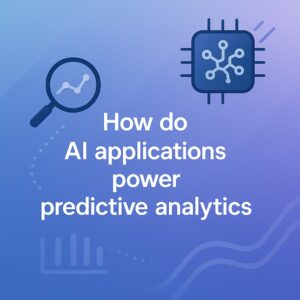
Turning data into smart future guesses. Have you ever wished you could predict the future? Well, businesses are getting close, thanks to AI applications in predictive analytics. These smart tools help companies guess what might happen next, using data they already have.
Let’s break it down in a simple way.
AI makes sense of big data
Every time you click a link, buy something online, or even scroll on social media, you leave behind data. But there’s so much of it that humans can’t go through it all. That’s where AI applications help.
AI can scan huge amounts of data super fast. It finds patterns and tells businesses what those patterns might mean for the future. For example, if many people buy jackets in October, AI can predict that jacket sales will go up again next October.
Predicting customer behavior
Ever wondered how online stores know what you might want to buy next? AI in predictive analytics do this by studying your browsing history, past purchases, and even the time you spend looking at certain products.
This helps businesses offer you products before you even ask. It’s like when Netflix suggests a new show because you liked something similar. Predictive analytics makes these suggestions smarter and more personal.
Helping businesses plan ahead
Predictive analytics isn’t just for shopping. AI applications also help companies plan for the future. For example, if a delivery company notices delays on certain routes, AI can predict future delays and suggest better routes.
In schools, predictive analytics can help spot students who might need extra help by looking at their performance data. This way, teachers can step in early and offer support.
AI improves decision-making
With predictive analytics, businesses can make smarter choices. Should they launch a new product? When is the best time to post on social media? AI applications can give answers based on data, not just guesses. This reduces risks and helps companies save time and money.
AI applications are revolutionizing the manufacturing industry
How is AI making factories smarter and faster?
When you think of a factory, you might imagine loud machines and people working on assembly lines. But guess what? Things are changing. Now, AI applications are making factories way smarter and more efficient.
Let’s see how AI is shaking up the manufacturing world.
Robots that can think (almost)
In the past, robots in factories just repeated the same task over and over. But now, AI applications give them a brain. These robots can spot mistakes, fix problems, and even adjust their work on the go.
For example, companies like Tesla use AI-powered robots to build cars with amazing precision. They work faster, make fewer mistakes, and help factories run smoothly.
Fixing machines before they break
Imagine if your washing machine could tell you it’s about to stop working. That’s what AI does in factories. AI applications keep an eye on machines, listening for weird sounds or watching for tiny issues.
If something seems off, AI sends an alert. This way, workers can fix the problem before it causes a full breakdown. No delays. No wasted time.
Quality checks made simple
Every product needs to be checked for quality. But checking each item by hand? That takes forever. AI applications solve this with smart cameras and sensors. They scan products super quickly and spot even the smallest defects.
This means only top-quality items go out to customers, and companies save money by avoiding bad batches.
Smarter supply chains
Factories don’t just build things. They need to get materials on time and ship products fast. AI applications help manage all of this. AI can predict delays, suggest better delivery routes, and make sure materials are always in stock.
It’s like having a super-smart planner who keeps everything on track.
The big picture
In simple words, AI applications are transforming how factories work. They help build products faster, fix machines before they break, and keep quality high. This makes manufacturing smoother, cheaper, and better for everyone.
If you’re into tech, engineering, or business, this is a cool area to explore. AI in factories is the future—and it’s already happening.
Best AI applications and tools for small businesses
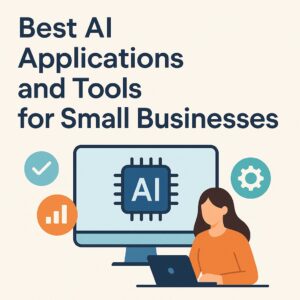
Running a small business can be tough, but AI are here to make life easier. Some awesome tools can save you time and help your business grow. Let’s dive into some of the best AI applications for small businesses today.
AI tools for marketing
Marketing doesn’t have to be complicated. With AI tools like Jasper, you can quickly create content for your website or social media. Surfer SEO is another great tool that helps you rank better on Google, so more people can find your business. These AI applications handle the technical side, letting you focus on what you do best.
Tools for customer support
Customer service is key for any business, but it can be time-consuming. AI tools like ChatGPT can answer common customer questions anytime, day or night. This means you can keep your customers happy without always being on the clock.
AI tools for managing money
Keeping track of money is super important for small businesses. AI apps like QuickBooks can help you track your spending and generate reports. They take the guesswork out of your finances, so you can know exactly where your business stands.
AI are changing the game for small businesses. Whether you need help with marketing, customer support, or managing money, these tools can make your job a whole lot easier.
AI applications enhancing cybersecurity and threat detection
Cybersecurity is super important these days, especially with all the online risks. AI applications are helping make things safer by detecting and preventing threats. These tools work fast and smart, spotting problems before they can do damage. Let’s take a look at how AI is improving cybersecurity.
How do AI applications detect threats?
AI applications are awesome at finding threats. They can quickly go through tons of data and spot strange patterns that might signal something’s wrong. For example, if there’s weird activity on your network, AI tools can spot it and send an alert. This helps stop cyberattacks before they happen.
In what way AI applications respond to threats?
AI doesn’t just find threats—it can act on them too. Some AI can automatically block harmful users or isolate infected devices. This means you don’t have to wait for someone to manually deal with it, making cybersecurity faster and more efficient.
How do AI applications predict future attacks?
AI is also getting better at predicting attacks. By looking at past data, it can spot trends and guess what might happen next. This lets businesses prepare ahead of time and stay one step ahead of potential threats.
AI applications are making cybersecurity stronger and faster. Whether it’s detecting, stopping, or predicting attacks, these tools are helping keep the internet safer for everyone.
AI applications transforming education technology (EdTech)
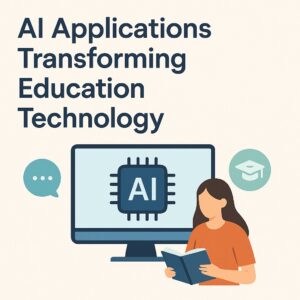
AI is changing the way we learn. With the rise of EdTech, students now have smarter tools to study, practice, and improve. AI applications are at the heart of this change, making learning more fun and personal. Let’s see how these AI applications are transforming education today.
Personalized learning
Not every student learns the same way. AI applications help by creating lessons that match your learning style. For example, apps like Duolingo use AI to adjust lessons based on how well you’re doing. This way, you get the right level of challenge and can learn at your own pace.
AI applications for smart tutoring
AI applications also act like personal tutors. Tools like ChatGPT can explain difficult topics in simple words, answer questions, and even help with homework. This gives students extra support outside the classroom, making learning easier and less stressful.
AI applications for grading and feedback
Teachers spend a lot of time grading. AI applications help by quickly checking assignments and giving instant feedback. This saves time for teachers and helps students see their mistakes faster. With AI, you don’t have to wait days to know how you did.
AI applications are truly transforming EdTech. From personalized lessons to smart tutoring and quick feedback, these tools are making learning better and more exciting for students everywhere.
FAQs: AI applications
What are AI applications?
AI applications are software or tools that use artificial intelligence to do tasks. They can learn from data, make smart decisions, and help with work like writing, learning, or even detecting cyber threats. You see AI applications in apps like chatbots, language tools, and study helpers every day.
How do AI applications help students?
AI applications help students by making learning easier and faster. They can explain hard topics, suggest study plans, and even quiz you. Many apps use AI to give instant feedback, so you know what to improve. These tools save time and make studying more fun.
Can AI applications help with homework?
Yes, AI applications are great for homework help. Tools like ChatGPT or Photomath can solve problems and explain answers step by step. They guide you to understand, not just give answers. This way, you learn while doing your homework with AI support.
Are AI applications only for school?
No, AI applications are not just for school. Businesses use them for customer support, cybersecurity, and marketing. Even apps for music, art, and fitness use AI. So, AI applications are helpful in many areas, not just in the classroom.
Do AI applications replace teachers?
AI applications do not replace teachers. They are here to help with extra learning, quick answers, and practice. Teachers still guide and explain in ways AI can’t. AI applications support learning but can’t replace real classroom teaching.
Are AI applications safe to use?
Most AI applications are safe if used correctly. Always check reviews and use trusted apps. Also, don’t share personal details with unknown AI tools. Safe AI applications protect your data and focus on helping you learn or work better.
Conclusion
AI applications are everywhere now. They’re making life easier in schools, businesses, and even at home. Whether you’re doing homework, running a small business, or just chatting with a bot, AI applications are quietly working behind the scenes.
These tools are smart because they learn from data. They help you write faster, learn better, and stay safe online. Instead of wasting time on boring tasks, AI applications do the heavy lifting for you. This gives you more time to focus on things you actually enjoy.
In the future, AI applications will get even better. You’ll see more apps that understand you, talk to you, and even predict what you need next. Learning how to use these tools now will give you a big head start.
AI are not just tech stuff for experts. They’re practical tools that can make your daily life smoother and smarter. From classrooms to careers, they are becoming essential.
So, are you ready to see how AI applications can make your life easier? Start exploring today and stay ahead of the game!

